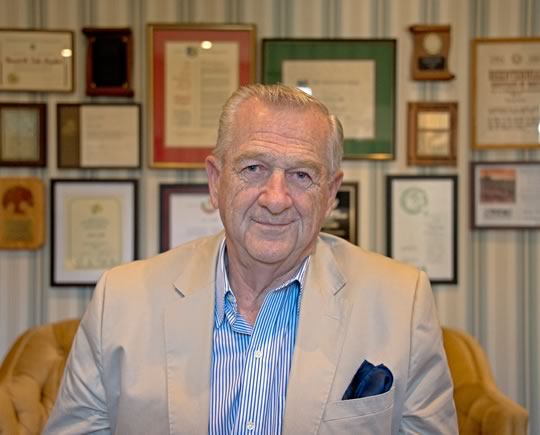Don Lobb
Local Hero: Don Lobb has a remarkable ability to make dirt fascinating.
Don Lobb: One of our 2013 Local Heroes
Dirt Farmer
Don Lobb has a remarkable ability to make dirt fascinating. Early in his farming career, Don developed an interest in the concept of no-till crop production, a way of growing crops from year to year without disturbing the soil through tillage. He has since become an internationally recognized expert in soil conservation and a pioneer in agricultural innovation.
Don was always an innovator, but his early experiences with adopting cutting-edge practices on his Huron County farm taught him that being ahead of the curve also entailed financial risk. “I almost lost the farm,” he says.

Don Lobb has a remarkable ability to make dirt fascinating. Photo by Pete Paterson.
As a result, when he began to consider converting to no-till in the late 1970s, he approached the project scientifically, meticulously tracking various strategies and yield rates. His careful study proved that, contrary to the conventional wisdom of the time, no-till could deliver similar and sometimes even higher yields, while providing substantial cost savings and helping to prevent soil erosion.
Before long a group of farmers in his area had come on board, and within a few years, the University of Guelph had also taken an interest. Don’s farm became a hub of no-till research in Ontario, and over the next 17 years it provided a site for more than 50 different university, government and agri-industry research projects. Farmers came from all over the world to attend field days there.
In 1998, Don moved to Caledon and now operates Don Lobb and Associates, a company that specializes in designing and building sports fields and installing indoor and outdoor footing material for equestrian facilities.
Although he is no longer on the farm, Don remains very much involved in agricultural soil science. His gobsmacking 11-page CV overflows with committee memberships, research projects, papers and presentations. Equally impressive is a long list of accolades, including honourary life memberships in the Soil Conservation Council of Canada and the Ontario Institute of Agrologists. In 2012 he won Agri-Food Canada’s L.B. Thomson Conservation Award, which honours pioneers in soil and water conservation. He was also honoured with a Queen Elizabeth II Diamond Jubilee Medal.
Though the no-till revolution has taken off, the practice is still resisted by some large-scale farming operations. “Instead of using management, they’re using iron,” Don says, referring to heavy farm machinery. “But quick and easy is not a way to manage land.” Part of the problem is that some large-scale operators, who might farm 15,000 acres, often rent the land, so aren’t as vested in it. “It’s contributing to soil degradation and the loss of both organic matter and soil life.”
Don sees many challenges for agriculture and soil in the coming years. He views landscape restoration, which in this context means moving topsoil back to the tops of knolls, and improvements in soil moisture management as key topics. In the longer term, he supports the development of perennial food crops.
The most urgent challenge, however, may be “closing the nutrient gap.” Phosphorus, used in fertilizer, ultimately goes to waste in the world’s current food production cycle. “We’ve only got 90 to 100 years of known supplies of phosphorus left at current usage rates,” he says, predicting that when the supply is depleted, “the impact will be far more serious than running out of oil.”
Despite these challenges, Don is an optimist. “Of course I’m hopeful about the future,” he says. “We find solutions to every problem eventually.”








Hello Don – from down here in Hastings County where my younger brother still farms the home farm and my wife’s relatives are also farmers. Yes, my wife and I bought 95 acres of sandy soil and a fair share of rocks in 1972. We hoped to demonstrate to local farmers how no-till might help produce a corn crop on sand – but no success – lots of heat but not sufficient moisture. Anyhow we learned to adopt and realized that asparagus could thrive on a deep sandy soil. So we’ve have some 30 years of successful asparagus production and farm gate sales.
Since leaving Guelph, I have retained my OIA membership and it was there I saw the announcement of your L.B. Thomson Conservation Award. I am truly glad to see this and heartily congratulate you on this well-deserved award. Although I am 96 this month, I keep watch on soil science affairs by internet and I see you have achieved much more. Little did I realize back in the 1960’s when I visited your Huron County farm that your passion for soil conservation would achieve so much. I did appreciate how you helped me promote no-till at that time. The practice has come a long way since and served Ontario agriculture well.
All I can do now is wish you well for the future, keep well and enjoy life. I like your optimistic statements – “Of course I’m hopeful about the future” and “We find solutions to every problem eventually”. Thanks for all. John
Jack (John) Ketcheson from 1702 Fish and Game Club Rd, Frankford, On, K0K 2C0 on Nov 1, 2014 at 10:08 pm |
Hello Dr. Jack Ketcheson! It is absolutely wonderful to hear from you and I thank you for your kind remarks. Over the years, I have made soil protection and responsible soil management my cause. For this, I have received many accolades and much recognition. I must share credit for that with you. As a soil scientist and professor at the University of Guelph some of your research exposed the clues that allowed us to make practices like no-till crop production the preferred system for serious land managers.
Agriculture owes much to you.
I am most impressed that you have maintained your membership in the Ontario Institute of Agrologists and maintained interest in practical agriculture. Too many abandon the mission of their professional career when they retire.
Thank you. With best regards,
Don Lobb
Don Lobb on Nov 6, 2014 at 1:49 pm |